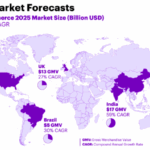This uptick marks a turning point following a challenging period for German e-commerce. In 2023, the sector experienced a significant decline of 11.8%, the first double-digit drop in its history. The total online revenue for the first half of 2024 stands at €38.1 billion, reflecting a 1.2% decrease compared to the same period in 2023. While not a complete reversal of fortunes, this growth indicates a potential return to stability for the German online retail sector.
Digital Services Lead the Charge
The report highlights a key driver behind the recent growth – a surge in digital service sales. This category, encompassing travel bookings and ticket purchases, witnessed a 4.2% increase in the second quarter, reaching €3.72 billion. The first half of 2024 saw an even more impressive increase of 8.4% for digital services, totaling €6.45 billion. This suggests a growing consumer appetite for online travel and entertainment options.
Pockets of Growth Across Product Categories
Beyond digital services, growth was observed in 12 out of 19 product categories surveyed by Bevh. Food orders emerged as the standout performer, registering a robust 6.2% increase to €1.004 billion in the second quarter. The furniture sector (furniture, home textiles, and household appliances) also exhibited positive growth, expanding by 1.6% during the same period.
Normalization on the Horizon?
Martin Groß-Albenhausen, Deputy General Manager of Bevh, expresses cautious optimism regarding a potential market normalization. He cites rising incomes exceeding recent inflation rates as a contributing factor. However, Groß-Albenhausen acknowledges lingering uncertainties, including geopolitical tensions and potential bankruptcies, which could dampen consumer confidence and hinder continued growth.
Marketplaces: A Catalyst for Recovery
The report underscores the pivotal role of online marketplaces in the German e-commerce recovery. These platforms experienced a 2.3% growth spurt in the second quarter, capturing a significant 55% market share for the first half of 2024. This trend suggests that marketplaces are proving to be a crucial engine for growth within the German online retail landscape.
Challenges Remain: Competition and Regulation
Despite the positive indicators, the German e-commerce sector faces ongoing challenges. The report highlights concerns among nearly half of surveyed B2C online retailers regarding restrictive German and European regulations hindering e-commerce growth. Additionally, the rise of prominent Asian marketplaces like Temu poses a potential threat to the competitiveness of local players.
Looking Ahead: A Cautiously Optimistic Outlook
The German e-commerce landscape exhibits tentative signs of recovery, driven by growth in digital services, select product categories, and the continued dominance of online marketplaces. However, lingering uncertainties and competitive pressures necessitate continued monitoring. DMSMatrix will keep a close eye on developments in this dynamic sector and provide updates as they become available.










